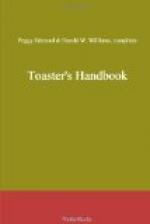“And they fed five thousand men on five loaves of bread and two fishes.”
He waited a moment, and then, leaning over the pulpit and looking at the amen corner, he said:
“And could you do that, too, Mr. Smith?”
“Of course I could,” Mr. Smith replied.
“And how would you do it?” said the preacher.
“With what was left over from last Sunday,” said Mr. Smith.
The late Bishop Foss once visited a Philadelphia physician for some trifling ailment. “Do you, sir,” the doctor asked, in the course of his examination, “talk in your sleep?”
“No sir,” answered the bishop. “I talk in other people’s. Aren’t you aware that I am a divine?”
“Yes, sir,” said the irate man, “I got even with that clergyman. I slurred him. Why, I hired one hundred people to attend his church and go to sleep before he had preached five minutes.”
A noted eastern Judge when visiting in the west went to church on Sunday; which isn’t so remarkable as the fact that he knew beforehand that the preacher was exceedingly tedious and long winded to the last degree. After the service the preacher met the Judge in the vestibule and said: “Well, your Honor, how did you like the sermon?”
“Oh, most wonderfully,” replied the Judge. “It was like the peace of God; for it passed all understanding, and, like His mercy, I thought it would have endured forever.”
The preacher’s evening discourse was dry and long, and the congregation gradually melted away. The sexton tiptoed up to the pulpit and slipped a note under one corner of the Bible. It read:
“When you are through, will you please turn off the lights, lock the door, and put the key under the mat?”
The new minister’s first sermon was very touching and created much favorable comment among the members of the church. One morning, a few days later, his nine-year-old son happened to be alone in the pastor’s study and with childish curiosity started to read through some papers on the desk. They happened to be this identical sermon, but he was most interested in the marginal notes. In one place in the margin were written the words, “Cry a little.” Further on in the discourse appeared another marginal remark, “Cry a little more.” On the next to the last sheet the boy found his good father had penned another remark, “Cry like thunder.”
A young preacher, who was staying at a clergy-house, was in the habit of retiring to his room for an hour or more each day to practice pulpit oratory. At such times he filled the house with sounds of fervor and pathos, and emptied it of almost everything else. Phillips Brooks chanced to be visiting a friend in this house one day when the budding orator was holding forth.
“Gracious me!” exclaimed the Bishop, starting up in assumed terror, “pray, what might that be?”
“Sit down, Bishop,” his friend replied. “That’s only young D—— practising what he preaches.”




